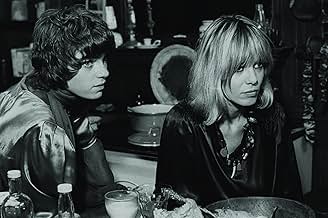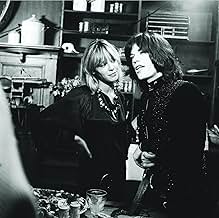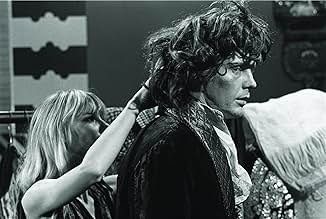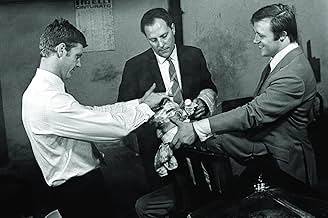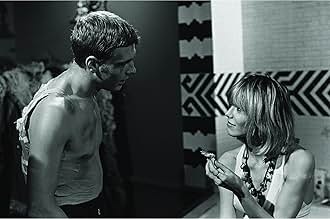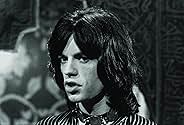A violent East London gangster undergoes a transformation of identity while hiding from his former colleagues in the home of a jaded Bohemian rock star and his two girlfriends.A violent East London gangster undergoes a transformation of identity while hiding from his former colleagues in the home of a jaded Bohemian rock star and his two girlfriends.A violent East London gangster undergoes a transformation of identity while hiding from his former colleagues in the home of a jaded Bohemian rock star and his two girlfriends.
- Nominated for 1 BAFTA Award
- 1 nomination total
Michèle Breton
- Lucy
- (as Michele Breton)
Anthony Morton
- Dennis
- (as Antony Morton)
Kenneth Colley
- Tony Farrell
- (as Ken Colley)
Edmond Bennett
- Detective Sergeant
- (uncredited)
Helen Booth
- Noel's mum
- (uncredited)
John Caesar
- Ticket Clerk
- (uncredited)
Jay Denyer
- Constable
- (uncredited)
- Directors
- Writer
- All cast & crew
- Production, box office & more at IMDbPro
Storyline
Did you know
- TriviaAccording to Anita Pallenberg, one scene actually shows her shooting heroin, which she was just starting to get into at the time.
- Alternate versionsIn most versions the voices of Johnny Shannon, John Bindon and Laraine Wickens have been overdubbed. This was because the actors' own voices were thought to be "too cockney" for non-UK audiences to understand. The 2007 Region 2 DVD (DY11687) features the voices of all three actors throughout the feature, none of the previous overdubs are present in this version.
- ConnectionsFeatured in Performance: Memo from Turner (1970)
Featured review
Here is a movie that cannot be classified in any subcategory. Many viewers of now and then seemed to be disturbed by its lack of evident meaning or message. Starting more or less like a gangster flick, it abruptly turns halfway through into a psychedelic trip, where Mick Jagger appears, in one of his rare screen roles, as a retired rock star.
No doubt, "Performance" doesn't do much effort to be easily understood. If you like stories with a clear plot, well defined characters and a happy ending, then skip this one. In order to enjoy that movie, you should better give up your rationality for a while. There are many interpretations one can have about it, but they will most likely come in the second run. Like a dream, "Performance" is a visual and mental shock where nothing comes as expected, and it lets you wake up dazed and confused by its so peculiar atmosphere.
What I find most puzzling about it is how far ahead of its time this movie was in every aspect. It was shot in 1968, but released only two years later because the distributors were obviously not prepared for this kind of "performance", and had not seen anything alike before. Western society was undergoing incredibly fast and drastic mutations, and the culture shock that happened in those days is at the very heart of the picture. It was "time for a change". Just like the main character, the western world would never be the same again afterwards.
Interesting fact : a mere five years before, the lead actor James Fox had played in "the Servant", a film based on a play by Harold Pinter with a story that has a lot in common with "Performance". "The Servant" appeared highly controversial by then because of its allusions to seedy sex, but it was shot in black and white with very conventional filming, editing and acting, and a very outdated jazzy soundtrack. Hard to believe it takes place in the same city (London) with the same lead actor within just a five year gap.
Nothing about "Performance" is conventional. It takes off immediately into a hectic pace, flashy colors, haunting music, and very graphic sex and violence. The London crime world is photographed with a rare accuracy. Actually, one of the guys playing the gangsters happened to be a real life gangster. Then suddenly, by a random twist of fate, the cockney villain (no heroes here) is propelled into another completely different underground scene, where "nothing is true, everything is permitted". He meets his alter ego as a has-been pop musician living secluded in a red-walled mansion covered with mirrors, together with a duet of intriguing women. Hallucinogenic mushrooms are casually served at breakfast, notions of time and space fade away, while gender, identity and truth get blurred. The two main characters gradually merge together and though both of them seemingly get doomed by their fate in the end, you don't know by then which of them is whom anymore.
I don't know of any other movie where you see a Rolls Royce burning down in an acid bath, gangsters performing a strip-tease show, or a plunging view inside a skull as a bullet is shot through it, least all of them together. Besides, the recurring use of mirrors all throughout the picture, the constant play with colors and the superimposing of faces and images don't have many parallels either in film history.
Of course, if you are a Rolling Stones fan, this movie is a must-see, but then you probably have seen it already. Like the main character, the Rolling Stones began as English street kids, and came to explore a world of sex, drugs and rock&roll where one of them actually lost his life. In "Performance" , an androgynous long-haired Mick Jagger with pouting lips is at the acme of his character, while blond and foxy Anita Pallenberg, who had affairs with three members of the band, and freckled boyish Michèle Breton fit perfectly into the scenery .
If there was to be a "pop-art" movie, that would be it. You may love or hate this film, but for sure, it is daringly creative and experimental, and anything but ordinary. To quote the character played by Jagger : "the only performance that makes it, that really makes it, is the one that achieves madness".
No doubt, "Performance" doesn't do much effort to be easily understood. If you like stories with a clear plot, well defined characters and a happy ending, then skip this one. In order to enjoy that movie, you should better give up your rationality for a while. There are many interpretations one can have about it, but they will most likely come in the second run. Like a dream, "Performance" is a visual and mental shock where nothing comes as expected, and it lets you wake up dazed and confused by its so peculiar atmosphere.
What I find most puzzling about it is how far ahead of its time this movie was in every aspect. It was shot in 1968, but released only two years later because the distributors were obviously not prepared for this kind of "performance", and had not seen anything alike before. Western society was undergoing incredibly fast and drastic mutations, and the culture shock that happened in those days is at the very heart of the picture. It was "time for a change". Just like the main character, the western world would never be the same again afterwards.
Interesting fact : a mere five years before, the lead actor James Fox had played in "the Servant", a film based on a play by Harold Pinter with a story that has a lot in common with "Performance". "The Servant" appeared highly controversial by then because of its allusions to seedy sex, but it was shot in black and white with very conventional filming, editing and acting, and a very outdated jazzy soundtrack. Hard to believe it takes place in the same city (London) with the same lead actor within just a five year gap.
Nothing about "Performance" is conventional. It takes off immediately into a hectic pace, flashy colors, haunting music, and very graphic sex and violence. The London crime world is photographed with a rare accuracy. Actually, one of the guys playing the gangsters happened to be a real life gangster. Then suddenly, by a random twist of fate, the cockney villain (no heroes here) is propelled into another completely different underground scene, where "nothing is true, everything is permitted". He meets his alter ego as a has-been pop musician living secluded in a red-walled mansion covered with mirrors, together with a duet of intriguing women. Hallucinogenic mushrooms are casually served at breakfast, notions of time and space fade away, while gender, identity and truth get blurred. The two main characters gradually merge together and though both of them seemingly get doomed by their fate in the end, you don't know by then which of them is whom anymore.
I don't know of any other movie where you see a Rolls Royce burning down in an acid bath, gangsters performing a strip-tease show, or a plunging view inside a skull as a bullet is shot through it, least all of them together. Besides, the recurring use of mirrors all throughout the picture, the constant play with colors and the superimposing of faces and images don't have many parallels either in film history.
Of course, if you are a Rolling Stones fan, this movie is a must-see, but then you probably have seen it already. Like the main character, the Rolling Stones began as English street kids, and came to explore a world of sex, drugs and rock&roll where one of them actually lost his life. In "Performance" , an androgynous long-haired Mick Jagger with pouting lips is at the acme of his character, while blond and foxy Anita Pallenberg, who had affairs with three members of the band, and freckled boyish Michèle Breton fit perfectly into the scenery .
If there was to be a "pop-art" movie, that would be it. You may love or hate this film, but for sure, it is daringly creative and experimental, and anything but ordinary. To quote the character played by Jagger : "the only performance that makes it, that really makes it, is the one that achieves madness".
- francheval
- Feb 9, 2006
- Permalink
- How long is Performance?Powered by Alexa
Details
Box office
- Budget
- £750,000 (estimated)
- Runtime1 hour 45 minutes
- Color
- Sound mix
- Aspect ratio
- 1.66 : 1
- 1.85 : 1
Contribute to this page
Suggest an edit or add missing content



